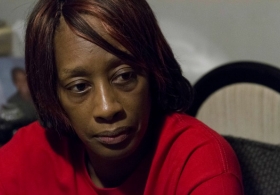Someone has murdered your loved one, there are no suspects and soon the case goes cold.
You’re not sure how to pay for the funeral, you have questions for investigators, and your family could benefit from

counseling.
What do you do? What rights do you have? Where do you turn?
There’s little the state of Illinois, local law-enforcement agencies or other government officials have to do for you.
That’s because victims and their families have very few rights when no one has been charged in their case, said Jennifer Bishop-Jenkins, the director of Marsy’s Law for Illinois, a group that advocates for victim rights.
There are 10 victim’s rights outlined in the Illinois Constitution, and all but one apply only if someone has been charged and the case is moving through the criminal justice system.
The Illinois Constitution states in Section 8.1 of the Bill of Rights that crime victims shall be treated with fairness and respect, be notified of court proceedings and have the right to receive restitution, among other rights.
Advocates note that most of the rights outlined in the Illinois Constitution are also included in many other state constitutions. However, the problem in Illinois is that victim rights aren’t enforced, they say.
State Rep. Lou Lang (D-Skokie) this year introduced a constitutional amendment that would give victims the ability to protest if they were denied these rights. The legislation would create an appeals process, giving victims whose rights are not upheld a chance to petition a judge, Bishop-Jenkins said.
But the amendment did not make it out of committee before the Illinois General Assembly called it quits last week.
“Illinois victim rights laws are not too bad, although they’re not enforceable, which is a big problem,” Susan Smith Howley, director of public policy at the National Center for Victims of Crime, said in an e-mail.
Other states, such as Arizona and Colorado, have more comprehensive and enforceable victim rights, according to Howley.
In Arizona, for example, victims have the right under that state’s constitution to receive the police report number and information about their case. If a victim is not contacted about an arrest within 30 days, the victim has the right to call law enforcement, be told the status of their case and find out whether an arrest has been made.
Following the lead of other states, Illinois in 1973 passed the Crime Victims Compensation Act, which allows victims and their survivors to be awarded up to $27,000 in restitution to help pay medical bills and funeral costs as well as make up for lost earnings, among other expenses.
Most victims get about $3,000 in compensation, said Dan Eddy, the executive director of the National Association of Crime Victim Compensation Board.
Restitution from the state isn’t automatic. If Al Capone were killed while committing a criminal act, his wife would not be eligible for state restitution because the death occurred while the victim was breaking the law, Eddy said.
Victims and/or their relatives must know about the fund and apply for the money.
The offices of Cook County State’s Attorney Anita Alvarez and Illinois Attorney General Lisa Madigan offer programs that help victims.
The help that most victims involved in unsolved cases get comes from community organizers and advocacy groups – not the government, Bishop-Jenkins said.
That’s something she hopes will eventually change. But the first step, she says, is making the laws already in place enforceable.
This story is part of a week-long series about homicides in Chicago. ChicagoTalks, a news outlet operated by Columbia College’s Journalism Department, undertook a semester-long investigation of the topic funded with a grant from The Chicago Community Trust. ChicagoTalks is publishing additional stories throughout the week. If you have questions or comments, please e-mail project editor Suzanne McBride at smcbride@colum.edu.
Read more from this series:
- Argument over basketball game takes parents’ only child
- Family seeks answers after 8th grader’s murder
- Family, friends of murdered Uptown businesswoman say they have been left in the dark
- Killer on the line
- Lonely anniversary
- For some, the grieving never ends
- Families say silence the norm after Chicago homicides
- Homicide victim’s mother sees progress in Englewood
- Giving up on justice
- Families question support after loved ones’ killings
- Unsolved homicide not forgotten
- Final call to a friend






















Be First to Comment